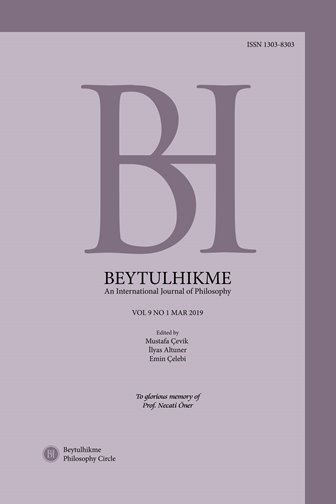Author :
Abstract
Aristotelesçi siyaset felsefesinde siyasal olanın temel fikri ve biçimi, özel bir “yetenek” biçimi olan konuşma üzerine temellenmiştir. Aristoteles’e göre, insan, anlamlı konuşma anlamına gelen logos sahibi olduğu için diğer politik hayvanlardan daha politiktir. Bu çalışmada, diğer biyolojik ve etik çalışmalarında tartışılan bazı argümanlara atıfta bulunarak, Aristotelesçi politik felsefeyi logos ve anlamlı konuşmanın kaynakları üzerinden tartışacağım. Bu çalışmalarda Aristoteles, ‘konuşma yetisi’ni Politika metninde “siyasal hayvanlık” olarak belirtilen durumla bağlantılandırılan “phone” başlığı altında kullanır. Aristoteles için insan diğer canlılardan daha politiktir, çünkü kendisinde onu politik kılacak doğal bir yatkınlık vardır. Bu çalışmanın amacı, Aristoteles'in politik felsefesinin biyolojik, metafizik ve etik varsayımlarının dahilinde tartışılması gerektiğini iddia etmektir.
Keywords
Abstract
In Aristotelian political philosophy, the basic idea and form of “politics” is structured on a specific “ability” referring to speech. According to Aristotle, man is much more a political animal than the other beings in nature because he has the logos, which refers to “meaningful speech”. In this study, I will discuss the Aristotelian political philosophy including the logos and sources of meaningful speech by referring to some arguments that are discussed in his other biological and ethical works. In those works, Aristotle discusses the “ability to speak” in a framework of the structure of the “phone” which is distinguishably connected to political animality in the Politics. For Aristotle, man is more political than other beings because he has natural and intrinsic tendencies that will make him political. The aim of this study is to claim that the political philosophy of Aristotle should be discussed within the arguments of his biological, metaphysical and ethical assumptions.
Keywords
- Aristotle (1991). Metaphysics. (Trans. J. H. McMahon). New York: Prometheus Books.
- Aristotle (1997). Politics. (Trans. P. L. P. Simpson). Chapel Hill: University of North Carolina Press.
- Aristotle (2002). De Anima. (Trans. D. W. Hamlyn). Oxford: Clarendon Press.
- Aristotle (2011). Nicomachean Ethics. (Trans. R. C. Bartlett & S. D. Collins). Chica- go: University of Chicago Press.
- Cooper, J. M. (1982). Aristotle on Natural Teleology. Language and Logos. (Eds. M. Schofield and M. Nussbaum). Cambridge: Cambridge University Press, 197222.
- Cooper, J. M. (1985) Hypothetical Necessity. Aristotle on Nature and Living Things. (Ed. A. Gotthelf). Bristol: Mathesis Publications, 150-167.
- Mayhew, R. (1999). King-Bees and Mother-Wasps: A Note on Ideology and Gender in Aristotle's Entomology. Phronesis, 44 (2), 127-134.
- Miller, F. D. (1995). Nature, Justice and Rights in Aristotle’s Politics. Oxford: Claren- don Press.
- Pellegrin, P. (2012). Aristotle’s Politics. The Oxford Handbook of Aristotle. (Ed. C. Shields). New York: Oxford University Press, 558-589.
- Sparshott, F. E. (1994). Taking Life Seriously: A Study of the Argument of the Ni- comachean Ethics. Toronto: University of Toronto Press.
- Trott, A. M. (2010). Logos and the Political Nature of Anthropos in Aristotle’s Politics. Polis, 27 (2), 292-307.
- Von Fritz, K. & Kapp, E. (1977). The Development of Aristotle’s Political Philos- ophy and the Concept of Nature. Articles on Aristotle: Ethics and Politics. (Eds. J. Barnes & M. Schofield & R. Sorabji). New York: Duckworth, 113134.





